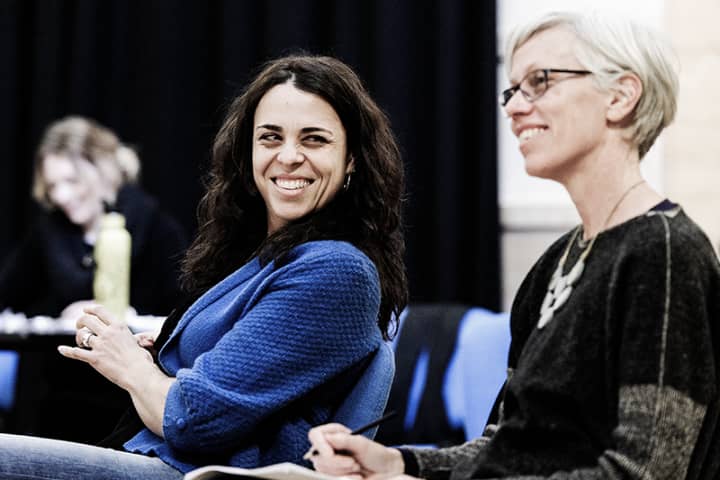‘Playwriting is essentially live decision making,’ Duncan Macmillan said in a newspaper interview just before Lungs opened in Washington DC in 2011. ‘Yes, of course, we are interested in scene; we are interested in character and story. But actually what we want, moment to moment, is to see characters making difficult decisions over time.’
Lungs may be, so far in a reasonably brief career, the purist expression of his theory of drama. From the first moment of the play, the audience is thrown into the thick of serious decision making, as a young couple argue their way towards whether to have a child or not. Out of their decision comes the need for other decisions, cascading down from the original crisis. The play has been a key work in his development, being simultaneously produced in October 2011 by the Studio Theatre in Washington DC and at the Crucible Theatre in Sheffield in a co-production by Paines Plough that later toured the UK. There have been subsequent productions throughout Europe and the USA, each company intrigued by the challenge of staging a two-character play without scenery, props or scene changes. The stripped-back playwriting was a product of how the first draft was written: practically overnight, in a sort of white heat.
‘I was bogged down on a writing project and I needed to shift gears,’ he told the Palm Beach ArtsPaper. ‘I sort of wanted to write something for my own pleasure in a way, nothing that was a commission for anywhere … I just wanted to write some dialogue, something that was a challenge and a gift for actors.’ Drawing on his own anxieties about turning thirty, his recent engagement and the responsibility of a shared mortgage, he started a dialogue between a couple standing in a queue in Ikea and just kept the conversation going, without registering the implied passage of time, not allowing the momentum to falter by breaking it up into scenes. He’d fix that later. ‘Writing it so quickly, I think I was interested in the conversation and not how it was going to be staged. When I looked at it the next morning, I decided I didn’t need to write in “Interior Bedroom”.’
Now in his mid-thirties, Macmillan began writing plays while an undergraduate at Reading University majoring in film studies. Rather than screenwriting, it was the craft of playwriting that got him hooked. He spent a number of years after university signing on to every playwriting class he could find. He did two MA courses and wound up on the Royal Court Young Writers Program, from which emerged his first produced play, The Most Humane Way to Kill a Lobster (2005). About a middle-aged woman who has a resurgent memory of a long-forgotten abuse, the play was picked up by small independent company Theatre503 and received good notices. As did his second major play, Monster, performed at the Royal Exchange during the Manchester International Festival in 2007, which won two Bruntwood Awards for Playwriting. Some of his early works received their first audiences on BBC radio: I Wish to Apologise for My Part in the Apocalypse, So Say All of Us, Family Tree and an adaptation of Eugene Onegin.
Certain general questions recur in Macmillan’s major work; all interrogate ideas of personal responsibility: Who is responsible? Who is to blame? Who is complicit? What can be helped? What can’t? In the past few years, since his success with Lungs, he has pursued these questions through a number of mature plays of impressive variety. In his 2014 one person show, Every Brilliant Thing (2014), a man goes through a list he began writing as a boy of everything worth living for, his response out of guilt and bewilderment at his mother’s suicide. Similarly, free will in a totalitarian state is the theme of his recent acclaimed adaptation, with Robert Icke, of George Orwell’s 1984 for Headlong Theatre Company. (It toured to Melbourne last October as part of the Melbourne Festival.) He investigated our responsibility towards the environment in 2071 (Royal Court, 2014), written in lecture form for them climate scientist Chris Rapley. And his most recent and most acclaimed play, People, Places and Things, a co-production with Headlong at the National Theatre and soon to transfer to the West End, is about drug addiction, individual accountability and how much blame we can pin on society.
Macmillan recently told IdeasMag, ‘For me, there has to be some kind of unresolved and possibly unresolvable moral conundrum at the heart of a new idea.’ When he was in the writers program at the Royal Court Theatre he took to heart a piece of advice from veteran British playwright Edward Bond: ‘He says, good dramatists instinctively know that the problem is all you got; that you should never solve the problem.’ By keeping the moments of decision coming while ensuring that no decision solves the characters’ problems is how Macmillan sustains the action in Lungs and, indeed, all his plays.
This is an edited excerpt from the Lungs production programme which can be purchased at the theatre. Lungs is playing at Arts Centre Melbourne until 19 March.
Published on 10 February 2016





